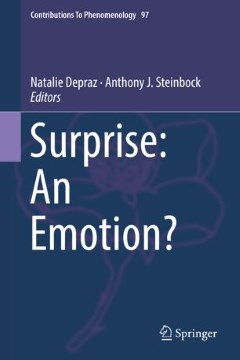The temporal dynamic of emotional emergence, surprise and depression
pp. 55-71
Abstract
Surprise is often considered an intense but brief emotional reaction and many authors contend that surprise is a primary emotion, like joy or fear. However, surprise has some remarkable particularities that question the view of surprise as a primary emotion. Indeed, surprise can be either good or bad, i.e. of a positive or negative valence, whereas all the other primary emotions can only be of one valence, either good (e.g. joy) or bad (e.g. fear). Besides, surprise is rarely isolated from other emotions and rather often belongs to a global emotional dynamic, as surprise is generally followed by other emotions, happiness or deception for instance. Focusing on the neurophenomenological approach, the view of surprise as composed of a 3 phases-dynamic offers new insights in the science of emotions from experimental science, including psychophysiology and neuroscience, to phenomenology. We have shown some of these new insights in a recent article (Desmidt T, Lemoine M, Belzung C, Depraz N: Phenomenol Cogn Sci 14:557–578, 2014) and we want here to focus on their interests in the understanding of the psychopathology of depression and to show how the neurophenomenological methodology of co-generativity applied to the experience of surprise can lead to the emergence of new hypothesis that are consistent with both 1st and 3rd person-approaches in the understanding of the physiopathology and the psychopathology of depression, as a psychiatric disorder.
Publication details
Published in:
Depraz Natalie, Steinbock Anthony (2018) Surprise: an emotion?. Dordrecht, Springer.
Pages: 55-71
DOI: 10.1007/978-3-319-98657-9_3
Full citation:
Desmidt Thomas (2018) „The temporal dynamic of emotional emergence, surprise and depression“, In: N. Depraz & A. Steinbock (eds.), Surprise, Dordrecht, Springer, 55–71.


